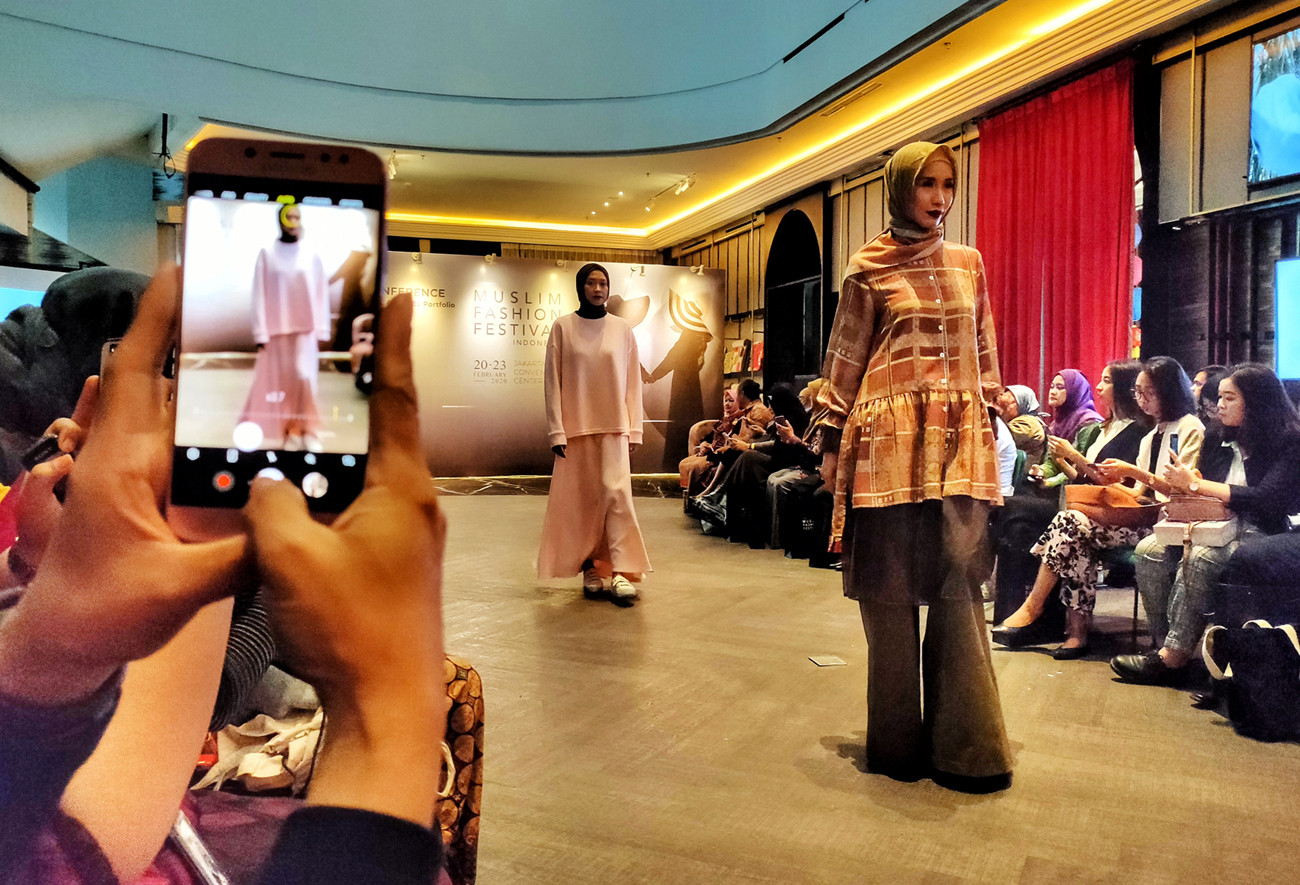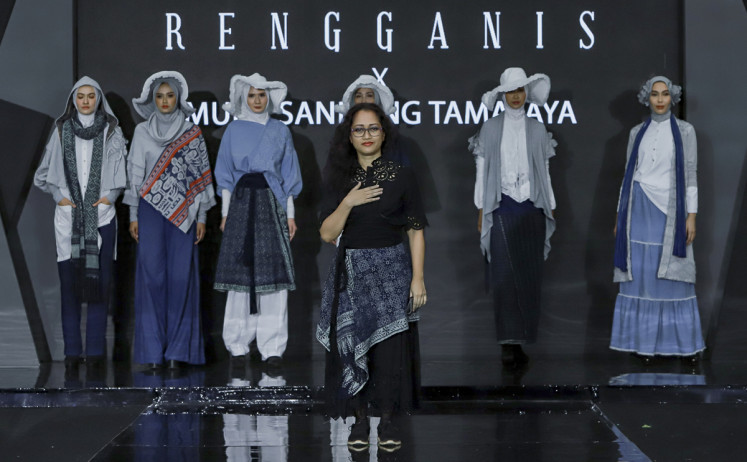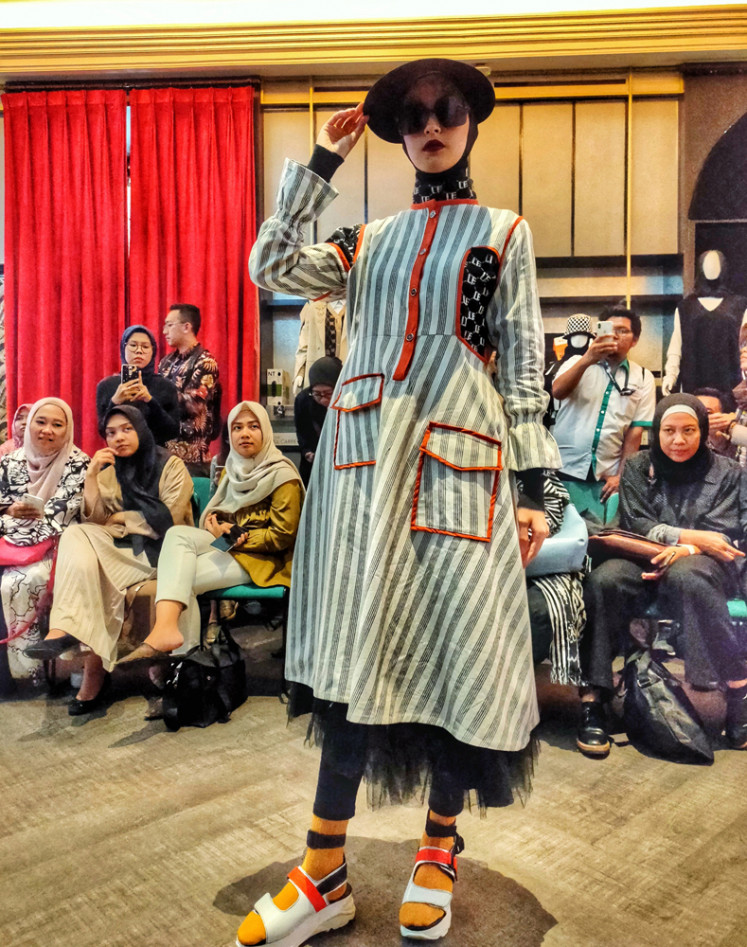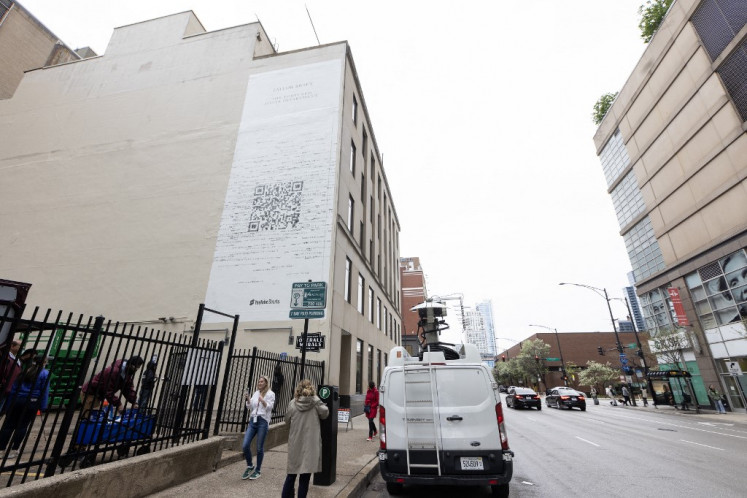Fashion issue: Indonesian diaspora and fashion designers come together
The pandemic has hit the fashion industry hard. As the government encourages everyone to stay at home to remain safe, people have less need for new clothes, bags, shoes and other fashion items – which has resulted in plummeting sales.
Change Size
 Industry in trouble: Models showcasing Muslim attires by IFC designers at the press conference of Muffest 2020. (JP/Sylviana Hamdani) (JP/Sylviana Hamdani)
Industry in trouble: Models showcasing Muslim attires by IFC designers at the press conference of Muffest 2020. (JP/Sylviana Hamdani) (JP/Sylviana Hamdani)
T
he pandemic has hit the fashion industry hard. As the government encourages everyone to stay at home to remain safe, people have less need for new clothes, bags, shoes and other fashion items – which has resulted in plummeting sales.
“Between March and July, a lot of [fashion] events were cancelled,” Ali Charisma, national chairman of the Indonesian Fashion Chamber (IFC), one of the largest fashion associations in Indonesia, told The Jakarta Post. “Many of our members experienced a sharp drop in their sales, of around 60%,” Ali added.
When all the shops and malls in Surabaya, East Java, were closed, Aldrie Indrayana, a fashion designer from the city, also experienced a drop in sales of his menswear brand Aldré.
“My collections have cutting-edge designs,” Aldrie explained. “My customers usually like to try them on before deciding to buy. When all the shops and malls were closed, my sales dropped down to 50%.”
Fashion designers are not the only ones in trouble. As fashion is a highly labor-intensive industry, small-scale producers such as batik artisans and traditional textile weavers have also struggled to survive.
“Many [of] my suppliers confided that they had lost 100% of their source of income during the pandemic,” Riri Rengganis, a fashion designer from Bandung, West Java, said.
Riri buys her textiles directly from traditional batik artisans and weavers in Baduy, Cirebon, Pekalongan, Klaten, Kupang, Sumba, Yogyakarta and many other parts of Indonesia.

“Most of [the batik artisans and traditional textile weavers] don’t understand the internet and solely depend on direct sales to tourists and fashion designers,” Riri added. “But during the pandemic, tourists were not allowed to come and fashion designers were not buying new supplies.”
Riri herself has also experienced an 80% drop in sales during the pandemic.
A silver lining
Every cloud has a silver lining. During a meeting held by the Trade Ministry in Jakarta early this year, Ali became acquainted with representatives of the Indonesian Diaspora Business Council (IDBC).
The IDBC is a non-profit organization that fosters trade and business connections between Indonesia and the countries where diaspora reside.
After a short discussion, the IDBC agreed to promote products by Indonesian fashion designers and help them go global. On Aug. 12, they signed a Memorandum of Understanding (MoU) that cemented their collaboration.
“This collaboration opens doors of opportunities for both our organizations,” Fify Manan, chairwoman of the IDBC, said during the MoU signing ceremony on Zoom on Aug. 12. “There are over 12 million [in the] Indonesian diaspora across the globe now. Together, we can achieve a lot for Indonesian fashion.”
IDBC tradelink
One of the facilities that the diaspora organization provides for IFC members and their partners is the IDBC Tradelink. The website is both a platform that showcases Indonesian products, as well as a business directory of Indonesian fashion designers and entrepreneurs.
“At the moment, we’re still focusing on Indonesian fashion and food and beverage products (on the IDBC Tradelink),” Astrid Vasile, IDBC vice president, said.
Through the MoU, the IDBC has appointed the IFC as the curator for the Indonesian fashion designers to be featured on the IDBC Tradelink.
“We’ve carefully curated the list of designers, so that only those that are reputable and ready to export will be featured on the IDBC Tradelink,” Ali said.

So far, approximately 30 Indonesian fashion designers have been featured on the website. All of them showcase photos of their collections, a brief profile of their business, their website and contact details.
“The IDBC Tradelink is like a shop’s windows,” Diski Naim, IDBC Australia deputy regional director who developed the online platform, said. The “Indonesian diaspora and buyers can see Indonesian fashion products on the website, read their profiles and contact them directly if they want to buy.”
This website is also easily accessible on mobile phones.
As both the IDBC and the IFC are non-profit organizations, all these services are provided to eligible fashion designers for free.
“I think the IDBC Tradelink will be very helpful for both Indonesian designers and diasporas,” Aldrie said.
“I used to live abroad and had a hard time finding batik or tenun [weaved] attire to attend formal functions,” the designer, who studied fashion at The Fashion Institute in Sydney and Central Saint Martins in London,” said. “Back then, I had to ask my friends and relatives to find these attires for me. They had to buy, pack and send them to me. It was a lot of hassle. With this platform, [the] Indonesian diaspora can easily browse the collections of Indonesian fashion designers and contact them directly if they see anything that they like.”
In addition to the business directory, the IDBC Tradelink also features events held by the IFC and featuring IFC designers, such as the upcoming Indonesia Sharia Economic Festival (ISEF) on Oct. 25 - 30 and Muslim Fashion Festival (Muffest) early next year.
“Approximately 30 IFC designers will showcase their collections during ISEF,” Ali Charisma said.
A discussion forum
Besides a business directory and a platform for promotion, the IDBC Tradelink also offers a discussion forum, in which Indonesian fashion designers and the diaspora may exchange information.
“Indonesian diasporas, for example, can give hints of what’s currently trending in their country, as well as their import regulations,” Astrid said. “And all the discussions will be held in Indonesian, which is our mother tongue. So, it’ll be very convenient for both [Indonesian fashion designers and diasporas].”
Astrid, who owns a construction business in Perth, Australia, has resided in the country for 23 years. She is also the founder and executive chair of Australia-Indonesia Businesswomen’s Network (AIBN).
A useful tip from Astrid based on the Indonesia – Australia Comprehensive Economic Partnership Agreement (IA-CEPA), was that almost all products, including fashion, coming from Indonesia enjoy free import tariffs.
“It’s an interesting fact to know for those seeking to export their products to Australia,” Astrid said.
Familiarity
To start their collaboration, the IDBC and the IFC have launched a series of Diaspora Talks on Zoom.
“As they say, ‘tak kenal maka tak sayang’” (if you don’t know it, you won’t love it), Astrid said. “Many of us don’t really know about the latest fashion developments in Indonesia, and vice versa. Therefore, we will hold these Diaspora Talks to get to know one another.”
The first Diaspora Talk, which was held on Zoom on Sept. 29, discussed the modest fashion industry in the Middle East and Africa, featuring fashion communities and business catalysts from these countries.
The second talk on Oct. 7 discussed sustainable markets in Europe, also featuring fashion communities and business catalysts from France and the Netherlands.
A two further Diaspora Talks are scheduled, discussing the modest-wear industry in the United States, followed by spring fashion trends in Australia and New Zealand. Yuyun Harper, Indonesian fashion stylist and business catalyst living in Perth, is scheduled to speak during the event.
“We hope business connections will happen during these talks,” Astrid said.
Riri is feeling excited about the collaboration between the IDBC and the IFC.
The “Indonesian diaspora are like our reps abroad,” the fashion designer said. “When they see and love our designs, they become our customers. Sooner or later, they will also promote our products to their friends, colleagues and clients in their countries. And maybe, they will also become our business partners.”









